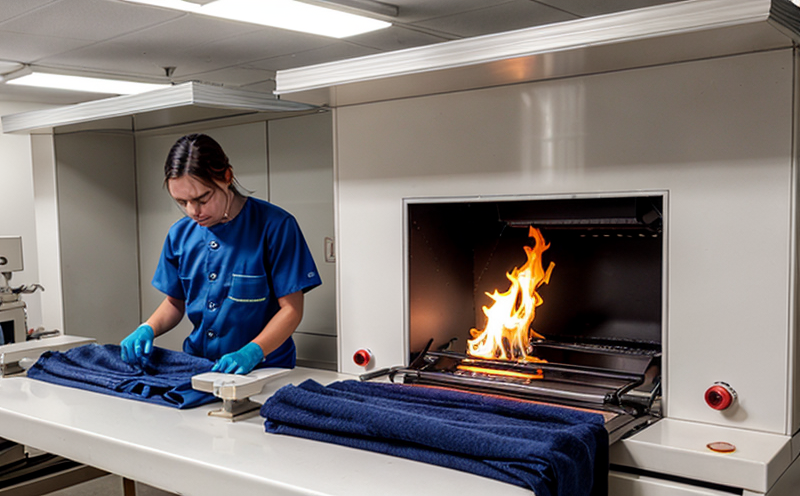Horizontal Flame Spread Testing of Apparel Fabrics
The Horizontal Flame Spread Test (HFST) is a critical component in ensuring textile and apparel products meet fire safety standards. This test evaluates the ability of fabrics to resist spreading flames under controlled conditions, which is essential for preventing fires and reducing burn injuries. The HFST follows specific protocols outlined by international standards such as ASTM D6413 and ISO 5295.
The primary objective of this testing method is to assess the flame spread characteristics of fabrics used in clothing items like shirts, trousers, and jackets. By simulating real-world scenarios, the test aims to provide a reliable measurement of how quickly flames can travel along the length of the fabric sample when ignited at one end.
During the HFST, samples are placed horizontally on a standardized heat source. Ignition is initiated from one side while an observer measures the distance flame travels across the width of the sample over time. This measurement provides valuable data about the flammability properties of various textiles used in apparel manufacturing. Compliance with this test ensures that clothing items do not pose significant risks to consumers during use.
Our laboratory utilizes advanced equipment calibrated according to global specifications to conduct these rigorous tests consistently and accurately. We employ highly trained technicians who adhere strictly to prescribed procedures ensuring consistent results across all samples tested.
The outcome of this test directly influences product safety ratings assigned by regulatory bodies worldwide. For manufacturers aiming to comply with international standards or local regulations, passing the HFST is crucial for maintaining market access and consumer trust.
Understanding the importance of proper specimen preparation is paramount in achieving accurate results from the HFST. Samples must be cut according to specific dimensions dictated by relevant standards. Preparing samples correctly ensures that they represent typical usage conditions accurately during testing.
Scope and Methodology
The Horizontal Flame Spread Test (HFST) involves placing a fabric sample horizontally on a heat source and igniting it at one end. The distance the flame travels across the width of the sample is measured over time, providing crucial insights into the fabric’s resistance to spreading flames.
- Sample Preparation: Samples are cut according to specified dimensions as per ASTM D6413 or ISO 5295 guidelines.
- Heat Source Activation: The heat source is activated, and ignition occurs at one end of the sample.
- Flame Spread Measurement: The distance flame travels along the width of the sample is recorded over time.
The test results are reported based on the distance the flame spreads across the fabric. These measurements help determine whether a given material meets specified flammability thresholds, thereby ensuring product safety and compliance with relevant standards.
Eurolab Advantages
At Eurolab, we pride ourselves on offering comprehensive textile testing services that cater specifically to the needs of industries focused on fire safety. Our expertise in conducting Horizontal Flame Spread Testing (HFST) sets us apart from other laboratories due to our unwavering commitment to precision and accuracy.
- Accurate Results: Utilizing state-of-the-art equipment calibrated according to international standards ensures precise measurements every time.
- Trained Technicians: Our team comprises highly skilled professionals with extensive experience in performing complex tests like HFST, guaranteeing reliable outcomes.
- Comprehensive Reporting: Beyond just providing numerical data, we offer detailed reports that interpret results within the context of relevant regulations and guidelines.
We understand how important it is for businesses to stay compliant with ever-evolving fire safety standards. By leveraging our technical know-how and cutting-edge facilities, Eurolab helps manufacturers maintain high-quality products while safeguarding their reputation and customer base.
International Acceptance and Recognition
- American Standards: ASTM D6413 is widely recognized in North America for its stringent requirements regarding horizontal flame spread testing of textiles. Compliance with these standards enhances product acceptance in the U.S. market.
- European Norms: EN ISO 5295, also known as NF P 90-124 in France, has been adopted throughout Europe and Asia-Pacific regions for evaluating flammability characteristics of fabrics used in clothing items.
- Asian Standards: Japan Industrial Standard (JIS) T 4126 provides specific criteria applicable to Japanese manufacturers seeking certification under strict fire safety regulations.
The HFST is a cornerstone of global textile industry quality assurance programs. By adhering strictly to these internationally accepted protocols, businesses can ensure their products meet the highest safety standards, fostering trust among consumers and regulatory authorities alike.





